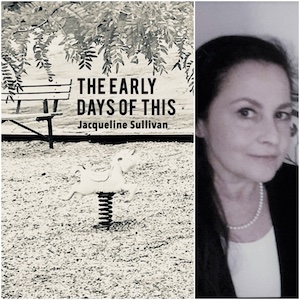By Eliza Browning
Jacqueline Sullivan (ΦBK, College of the Holy Cross) has found success in multiple areas of her career. A long-time trial attorney, she recently published her debut chapbook, The Early Days of This (2022), with Finishing Line Press. Sullivan embodies Phi Beta Kappa’s values of lifelong learning and curiosity across multiple subjects and disciplines. “My career in law is definitely intertwined with my writing,” Sullivan said. Pursuing a career that requires her to be observant, accurate, and defend her assertions proves to be an applicable skill set in writing poetry. “I would say there is a precision the law requires that, in part, applies to the creation of a poem,” Sullivan explained. “Put another way, when writing a poem I step back multiple times and revisit it to ascertain what it truly does or may represent and, essentially, how strong it is.”
A poem begins “as a response to something I feel compelled to try to memorialize,” Sullivan said. “Usually the poem finds me rather than the other way around.” She describes the process of publishing her debut chapbook as a long but rewarding process to navigate: “It has been helpful to remember that with poetry it seems it’s more of a marathon than a sprint.” The Early Days of This is inspired by moments of stillness and impermanence in the early days of the Covid-19 pandemic: “raggedy tendrils” of yellow forsythia, “daffodils at prayer,” fallen willows, and a grandmother’s “blue check dress as tall as a ship.” Here, absence in the form of distances or elegies is beautifully juxtaposed with the promise of renewal and reawakening offered by the natural world. Reaching back into memories of the past, Sullivan offers us hope for brighter days ahead.
Although the book was published during the pandemic, Sullivan said that “the themes it touches upon such as homage to ancestors, loss, redemption, and rebirth are universal and transcend time.” She does not set out to write about a particular subject, Sullivan explained: “I go where my art leads me. The poems in the collection may be about themes such as absence and loss but the poems led to the theme rather than the theme leading to the poems.” Sullivan draws upon her personal experience to memorably capture these universal themes in a way that resonates with a wide audience. A black-and-white photograph from a dictionary conjures her mother, “her jet-black hair / which at some point she let go / as white as marble,” while her long-haired nephew mowing the lawn “could have been micro-tiled in Rome / during the reign of Constantine,” “a Gothic chieftain with feathers in his braids,” or “living in a Gaelic hill fort.” Masterfully navigating between the past and the present, these poems connect the quiet moments of everyday life with the scope of human history.
A common thread throughout this collection is Sullivan’s use of ekphrastic poetry, or response to distinct works of literature or art. After encountering Francesco Pesellino’s Virgin and Child With a Swallow in the Isabella Stewart Gardner Museum in Boston, Sullivan was inspired to write an eponymous poem capturing the painting. The reference to the painter Pierre Bonnard in “Perspective” was inspired by a “time-travel event” where Sullivan purchased a print of Bonnard’s The Window and stopped at the top of a hill to view the city “in pewter distance” before encountering the print again in London. Imagining that the objects on the table belonged to Bonnard, Sullivan’s poem began to take shape. The poem “Reading Pushkin in Winter” was inspired by a candy bar printed with his poem “A Magic Moment I Remember” on the wrapper, with the snow outside causing her to reflect “ . . . how the snow will come and go. How time passes . . . ” she said.
The Early Days of This beautifully captures a transitional moment in history with resonance that extends far beyond the pandemic. With a memorable attention to detail and lyrical language, Sullivan is a poet to watch. “I envision a trilogy beginning with The Early Days of This,” she says of her future writing goals, adding, “Anything could happen.”
Eliza Browning is a master’s student at the University of Oxford studying modern and contemporary literature. She graduated Phi Beta Kappa in May 2022 from Wheaton College, where she was inducted in November 2021. Wheaton College is home to the Kappa of Massachusetts chapter of Phi Beta Kappa.




